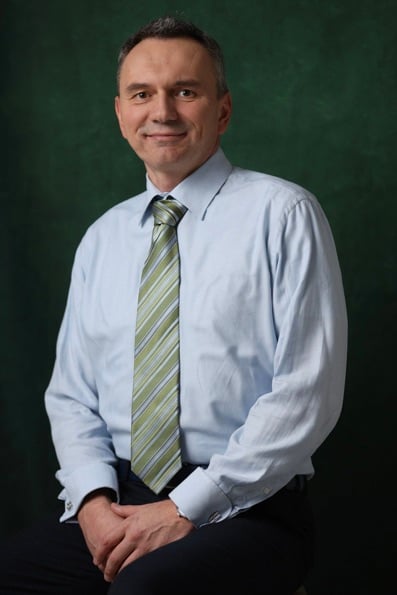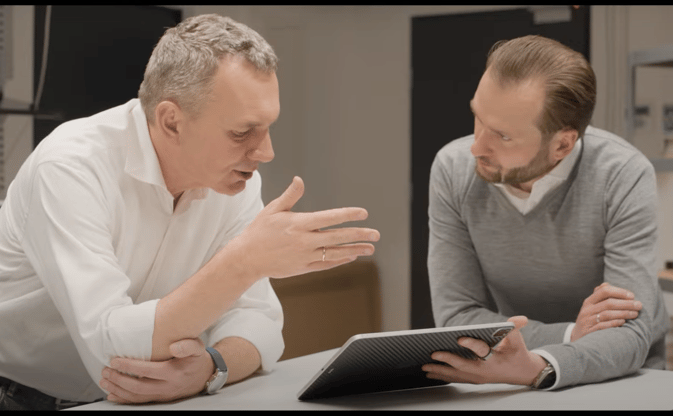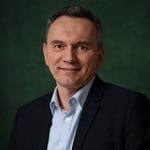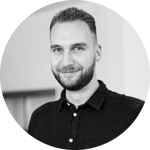
The process of helping humans that has no human limitations
Here's something that is considered inevitable but perhaps shouldn't: global shortages of healthcare workers.
Recently, WHO’s projection from 2018 was updated: by 2030, there will be 10 million health workers too little to meet patients’ needs.
Can MedTech change that? How should digital health solutions be designed to help doctors instead of burdening them with more tasks?
Untitled Kingdom’s Medical Director Marcin Maruszewski and Marketing Team Member Wojtek Jankowski sat down to discuss just that. Plus, what the term “doctor” will mean in the future, what is the Medical Director’s vision for his new role, and what does it mean that the healthcare model is “effective.”
Because in HealthTech development, it’s crucial to hear the voice of medical professionals.
Clickable Table of Contents
/
In this interview, Dr Maruszewski talks about…
...his career, arriving at the role of Medical Director, interest in MedTech
...the role of a medical professional in the age of technological advancements.
...collaborating with Untitled Kingdom specialists, responsibilities of a Medical Director, highlights of this collaboration (so far).
...the importance of a global approach to healthcare, the privilege of utilizing technical solutions.
...vision of the ideal healthcare model.
On becoming Medical Director & being interested in medical technology
Wojtek Jankowski: I’m very happy we get to do this.
Marcin Maruszewski: Me too.
I am happy because we finally get to talk at length and not just briefly chit-chat while working on different project. Why are you happy?
This announcement has been a long time in the making. My first conversations with Untitled Kingdom's CEO Piotr Zając, date back to 2021. So this is an end of 2-year discussions about my role and my involvement capacities because working as a surgeon will always remain my priority. So now, I’m happy to talk about it more, but I’m also excited for the moment when I get to talk less and work more.
So let’s talk in-depth one last time before we get to work. Your impressive body of work spans from being the General Manager of the Central Clinical Hospital of the Ministry of the Interior in Warsaw (2017-2019) to being a member of a surgical team that performed lung transplants on Covid-19 patients in Poland (2021). You have always been involved in the fields of both medicine and technology. Be it by collaborating with Cytograft Tissue Engineering, or co-developing tech solutions for advanced treatment.
Can you describe briefly how did you get where you are now? What were the most important professional steps that led you to the role of Medical Director?
I started my career over 20 years ago in one of the largest Polish cardiological centers. Beyond developing my surgical skills in thoracic transplantation, I was able to travel abroad. I worked in several world-renowned clinical centers, including the Medical University of Innsbruck in Austria, Royal Brompton and Harefield NHS Trust in London, and Stanford University in California.
There are two professional events I can highlight as the ones that led me to collaborate with a company offering product and software development for MedTech solutions, such as Untitled Kingdom.
The initial spark came through in 2006. I was invited to join a Silicon Valley-based tissue engineering company utilizing advanced techniques to improve the clinical outcomes of patients with end-stage renal failure. After several years of close collaboration with the engineers, I have come to appreciate the importance and significance of technical and engineering science that can allow clinical medicine to grow, progress, and reach a broad spectrum of patients.
Is that when your interest in MedTech innovation started?
It was always there, but that was the first time it manifested so clearly.
The second motivator came when I returned from the United States to Poland in 2009. I took a one-year postgraduate course on the application of information and technology solutions in the management of healthcare systems. I learned how artificial intelligence and machine learning in clinical medicine could speed up diagnosis and treatment by maintaining control and minimizing bias and risk of mistakes by providing solutions such as clinical decision-support systems.

Marcin Maruszewski, MD, PhD, MBA. Or, as he's called by most in the Untitled Kingdom, "dr Maruszewski."
Photo source: private archive.
On the role of a medical professional in the age of technological advancements.
When you say an “automated system” and letting doctors “intervene only when really needed,” some may think you are advocating for no involvement of doctors during the first stages of the patient diagnosis.
Far from it. We must not forget about the need for direct doctor-patient relationship. This requires time and focus on the patient’s concerns. But if we provide technical solutions that will replace some of the redundant doctor’s work, we will leave the doctors with more time to spend with their patients. Undoubtedly, it will improve the quality of the whole healthcare model.
At the same time, I have become fascinated by the fact that technology never gets sick, never gets tired, and is never on vacation. Allowing patients to access it without common human limitations. The technology behind clinical medicine will enable patients to get access to healthcare.
When I ran one of the largest Polish public hospitals, I became too aware that the restricted access to medical professionals creates a bottleneck in the whole healthcare system, thus transforming the health-care to sick-care system.
Hospitals remain the only kind of place where patients can access medical devices and diagnostics and the way that bottleneck is handled also corresponds directly with various management policies of medical facilities.
Overcoming those limitations by enabling medical devices and medical knowledge out of the hospital would benefit the patients and free the doctors from the burden of administrative tasks. In fact, it would lift off the unmet need put on the whole healthcare system.
So to answer your remark, I see the doctors as still very much involved in the patient care process, it’s just that their responsibilities and tasks will need to change.
Change how? From the perspective of a medical practitioner, how exactly will further advancements in medical technology change the role of a doctor?
It’s not just the change of the role. It’s a change in the definition and understanding of the role. Nowadays, the term ‘home’ or ‘family’ doctor does not refer to a doctor living nearby or in the neighborhood. Not anymore. Now, it means someone who understands and has a thorough knowledge of a specific family or individual, including potential inherited or acquired diseases. Someone who can offer the most personalized solutions - from drug prescriptions to medical techniques.
Provided the doctors will be consulted during the MedTech product development and medtech research and development, it is bound to improve medical doctors’ work.
Firstly, by giving access to reliable health knowledge. Verified, continuously updated scientific papers, health recommendations and medical guidelines combined with enormous amounts of health data from individual patients, highlighting their needs and everyday reality.
Secondly, MedTech gives a chance for more objective assessments. Regardless of our best intentions, if medical professionals base their decision-making process only on human skills, including personal experience and intuition, one must consider the huge risk of omitting solutions that have not come to one’s mind when clinical decisions are made. Medical technology may offer unbiased and unlimited access to a well-researched large data pool from teams of specialists.
Lastly, we would gain time. In everyday clinical life, patients often see a specialist way too late. Or patients do not follow our recommendations either due to their choice or, more often, due to a lack of understanding of what we expect them to do and how to behave following discharge from a medical facility. Not to mention patients who are busy and struggling to find time to travel for a medical visit. Occasionally, as doctors, we may feel our efforts are in vain. To change that, medical technology could support the patient to follow recommendations and live a healthy life by maintaining appropriate dietary behaviors, physical activity, prophylaxis, and diagnostic tests. Ensuring patients perform and behave accordingly without direct doctor’s supervision.
It would be a more efficient utilization of medical professionals’ time, allowing them to have some more private and recovery time.
Recovery time that is invaluable and translates to a decreasing number of medical professionals. Recently, researchers from a hospital in Massachusetts ran a survey of over 43 thousand healthcare workers. Over 15,000 physicians, 11,000 nurses, 5,000 members of clinical staff (pharmacists, nursing assistants, therapists, medical assistants, social workers), and over 11,000 non-clinical staff (housekeeping, administrative staff, lab technicians).
More than half are stressed, overworked, and ready to leave.
Exactly.
 Untitled Kingdom's Medical Director and CEO in conversation while making a short film for the Global Health Campaign (video available below - in the next section of this interview). Photo source: Reuters.
Untitled Kingdom's Medical Director and CEO in conversation while making a short film for the Global Health Campaign (video available below - in the next section of this interview). Photo source: Reuters.
On collaborating with Untitled Kingdom specialists, the responsibilities of a Medical Director, and the highlights (so far).
Coming back to the original question, why Untitled Kingdom, and why now? What made you decide to join us?
The short answer is - realizing that technology can be an answer to human limitations.
Well put. And what would the longer answer be?
As a cardiac surgeon, my impact is primarily limited by the time I need to spend in clinical research or saving human lives. And regardless of the importance of my work as a surgeon and the complexity of each performed procedure, the overall number of individuals impacted by my work is limited to 2 or a maximum of 3 people every day.
Whereas my work with Untitled Kingdom allows me to be engaged in processes that improve and impact the health of more individuals. Untitled Kingdom and its partners, through MedTech product development and MedTech engineering development program, allow for expanded progress in healthcare. For growing and offering new services to patients across the globe.
Similarly to the progress in conventional medicine, we need to introduce new technological concepts to keep up the pace of growing demand. Untitled Kingdom’s philosophy is Equality Starts with Technology - it’s to use medical technology to enhance and ease people’s access to healthcare services. And the solutions we developed are already creating some form of a portal to good health.
At some point, we have agreed at Untitled Kingdom that current health status should not be a limiting factor for people to live a good quality life.
So far, I haven’t been able to find another company or tech-driven group of people that would share my philosophy of providing help to people so well.
What exactly are your responsibilities as a Medical Director?
There are many, but it’s mostly about being involved in 4 different areas of Untitled Kingdom’s process of product and software development for MedTech solutions:
1. providing expertise: building the bridge between the world of medicine and technology.
2. collaboration: supporting teams working on medical projects to provide the best value for companies collaborating with Untitled Kingdom.
3. leadership: being involved in decision-making processes concerning the medical progress of the company.
And 4. education: running a medical education program for all the Untitled Kingdom citizens.
Any company ought to make sure that its employees understand the challenges, limitations, and risks associated with a problem that the solution they are working on will solve. In Untitled Kingdom, I will personally make sure that developers and engineers understand the potential impact of their work on the health outcomes of society.
The series of educational meetings you have run so far has been my favorite part so far. I love that as a team we get to meet regularly, take time from our everyday tasks to look at the bigger picture, and discuss specific aspects of medicine, the MedTech industry, and tech development.
How do you view your collaboration with Untitled Kingdom at this stage? What were your favorite moments so far?
I agree with you; there’s a unique team spirit here. I started my collaboration with Untitled Kingdom in 2021, and right from the start, I was impressed by all the engineers. Everyone is open to expanding their knowledge, working hard to overcome technical challenges, and is keen to understand biological, chemical, and physiological mechanisms behind the problem we are trying to solve. It’s a unique environment of high focus and curiosity.
And to be perfectly honest, so far, this collaboration has been quite challenging. You all have broad interests, open minds and ask insightful questions. You want to understand the need, the risks, the scale, and the potential benefits of the solutions you help to create. And I’m here to do my best to help you answer your questions.
But it is also why I find this work to be very inspiring. Together we are searching for novel solutions to improve current devices and create new diagnostic tools, prophylactic programs, screening solutions, and health monitoring devices.
We are privileged to utilize technology that has successfully improved our general quality of life, providing keys to communication, travel, and entertainment. It’s time to (finally!) offer these advances to improve human health.
And what are your stand-outs of this collaboration?
The highlight was working with the Untitled Kingdom team on a portable, pocket-sized ultrasound device. It was a small probe equipped with batteries and operated without cables or wires. Together, we reviewed the technology, discussed potential application options, and improved the device's performance and image quality.
I was amazed at what we were able to achieve. An application screen suggested where the probe should be located on the human body to obtain optimal results, making it extremely easy for the patient to apply and perform this examination on their own.
On looking at healthcare globally & the privilege of utilizing tech solutions.
You mentioned “the privilege” of being able to do this. While making the short film for the Global Health campaign (below), you and Piotr discussed the need to look at healthcare *globally* and how our actions in the US or Europe can affect other parts of the world.
This made me think about the current moment. We’re approaching half of the third decade of the 21st century. Right now, where do you see this rise of digital health devices and how they intersect with medical care?
Recently humankind has exceeded the total number of 8 billion people living on the earth. Citizens in developed societies can live up to their 90s, meaning infants born today may live to the 22nd century in countries with decent living conditions.
We also observe the constant progress of information technology, equipment, and advanced technological solutions.
A combination of these factors clearly shows that the demand for medical services is rising at a faster pace when considering the fact of an increasing number of people inhabiting the earth and living longer as compared to the not so keeping up the pace of medical professionals available to meet the growing demand for medical services.
Poverty and restricted access to healthcare prevention are still the sources of many diseases which can be easily transmitted by people who can travel quickly and freely. By not taking care of all people around the world, we are putting a threat to all humankind. We have seen small elements of that during the recent pandemic.
On the ideal healthcare model of the future
Last question, then.
I’m surprised you don’t think I have talked enough already.
Not at all. And thank you for being so generous with your time.
Listening to you now made me think of something that perhaps connects all the points you talked about - medical technology and where it fits in the professional practice and the contemporary challenges of the healthcare system.
Looking into the future, what is the goal of the digital transformation of the healthcare model? And how will we know if that model is effective and sufficient?
First of all, I’m concerned that we are still in the process of putting down the fire instead of preventing it. In my opinion, we utilize enormous resources to fight the consequences of the disease, but we’re still not concerned enough about prevention and thorough screening.
This is one of the reasons why MedTech innovation needs to focus on a widespread and affordable diagnosis. We must shift healthcare from hospitals and medical centers to patient homes. That’s why in the film (above), we decided to focus on remote patient monitoring devices.
At home, people will be provided with technical solutions to perform self-testing, self-examination, and health status surveillance. I see the future of healthcare where most of the preventive work will be done by the patients on their own with the use of medical and technical solutions, while medical professionals will focus on treatment and the development of new treatment options and solutions.
Also, we must consider the risks associated with medical data collection and utilization solutions that need to be developed. No system, political party, national government, or private company should be able to take advantage of people whose medical data become available. In my opinion, awareness of that potential risk should stimulate the medical industry to perform concurrent MedTech research and development on the safety of data collected from patients.
In my ideal world, I would like the patients to be provided with information at birth on potential risks, allergies, intolerances, and limitations of their bodies so that they could receive recommendations on how to live a happy and healthy life.
In this case, we could focus primarily on those who unluckily fell into situations where advanced medical help is necessary. I believe that the widespread prevention, prophylaxis, and diagnosis will save many human lives and improve the overall quality of human life across the globe.
All of that while ensuring that the utilization of health resources is much more efficient. I see humankind concluding that we should use the available resources more responsibly, which also refers to healthcare.
I wouldn’t mind waking up in the morning and learning the most recommended physical activity and dietary options for the day so that potential symptoms that I may feel will go away and my health satisfaction may improve. I would also like to live without the nightmare of getting sick someday and make sure that I can take control of these risks using medical diagnostic devices.
In the last few decades, healthcare shifted to more personalized solutions that require a lot of individual data to be collected, acquired, and processed so that each of us might receive a tailored treatment approach. I hope this trend will continue and bring great technological advancements.
That covers it. I’ve got no more questions.
I’m happy to continue or to end here. What do you think?
I think, just like you said earlier, the announcement part is over. Now, we get to talk less and work more.
Let’s get to work, then.
—
If you would like to collaborate with dr Maruszewski and the Untitled Kingdom Team, fill in the official contact form to schedule a call.
It costs nothing to talk.



